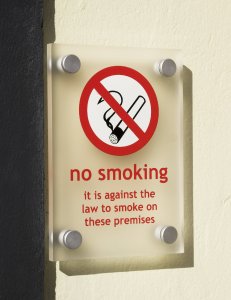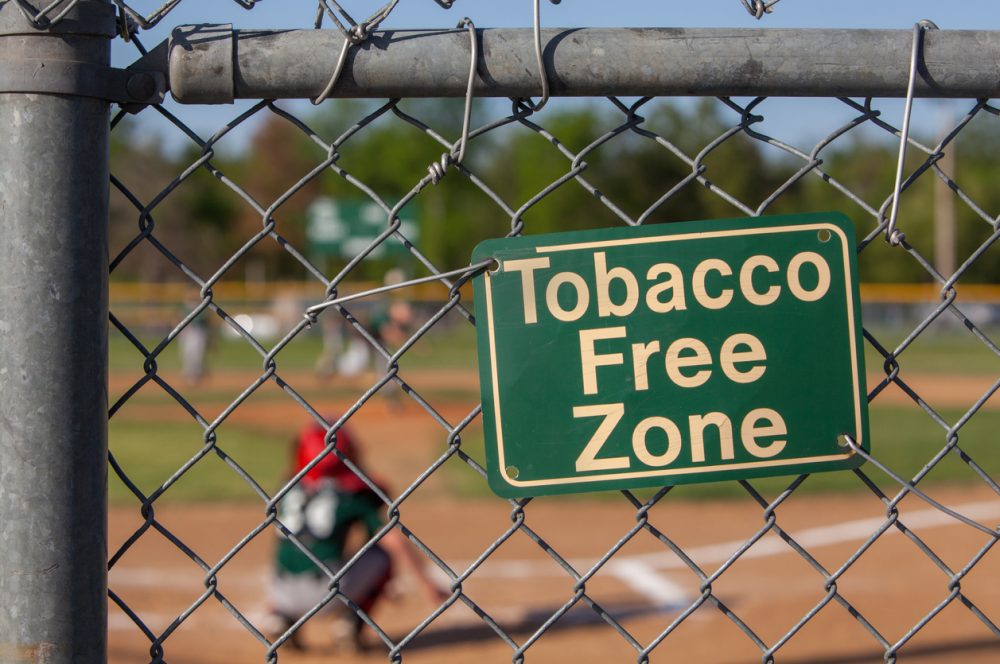Page checked 24 August 2022.
I’m guessing this news, and it IS news today, isn’t going to startle you. Smoking’s bad for us, whether we’re choosing to do it or getting second-hand smoke from others who do. Laws restricting where we can smoke were intended to reduce the harms of passive smoking and today Cochrane has published the most robust evidence yet indicating that they succeed in doing this and particularly in cutting the riskA way of expressing the chance of an event taking place, expressed as the number of events divided by the total number of observations or people. It can be stated as ‘the chance of falling were one in four’ (1/4 = 25%). This measure is good no matter the incidence of events i.e. common or infrequent. of heart disease. Smoking bans, it seems, are good for us all, with the biggest gains for non-smokers.
Is passive smoking really a big deal?
The World Health Organization estimates that there are around six million deaths each year from tobacco-related diseases; in adults, this is one death in every ten, worldwide. 600,000 of these deaths are from the effects of passive smoking.
Ireland was the first country to ban indoor smoking in all public places, back in 2004, and many other countries and regions have since done so, both to protect non-smokers from the effects of second-hand smoke and to support smokers who want to quit. It’s a change that’s gathered pace and we need research to keep up with it, to demonstrate if such legislation is having the intended effects.
What’s the evidence that smoking bans work?
Today’s new evidence comes from a Cochrane ReviewCochrane Reviews are systematic reviews. In systematic reviews we search for and summarize studies that answer a specific research question (e.g. is paracetamol effective and safe for treating back pain?). The studies are identified, assessed, and summarized by using a systematic and predefined approach. They inform recommendations for healthcare and research. Legislative smoking bans for reducing harms from secondhand smoke exposure, smoking prevalence and tobacco consumption, which has brought together the best available evidence on the effects of laws banning smoking. The first version of the review was published in 2010 and has now been updated (published February 2016), to bring in newer research. The review, carried out by a team funded by the Health Research Board in Ireland, looked at the effects of legislative smoking bans on death and disease from exposure to second-hand smoke and on smoking behaviour. It includes 77 studies (including 65 new ones) looking at populations of smokers and non-smokers from 21 countries. 44 studies looked specifically at cardiovascular disease (to do with the heart and blood vessels).
Here’s what they found:
- Consistent evidence of a reduction in heart disease and in deaths from smoking-related illnesses
- The greatest drop in hospital admissions for heart disease was in populations of non-smokers
- Five of six studies found an associationA relationship between two characteristics, such that as one changes, the other changes in a predictable way. For example, statistics demonstrate that there is an association between smoking and lung cancer. In a positive association, one quantity increases as the other one increases (as with smoking and lung cancer). In a negative association, an increase in one quantity corresponds to a decrease in the other. Association does not necessarily mean that one thing causes the other. between smoking bans and fewer hospital admissions for stroke
- Some evidence of a reduction in active smoking in pregnant women and so reduced passive smoke exposure for their babies. The impact on newborn babies’ health is unclear
- The impact on respiratory illnesses is unclear
- The impact of smoking bans on smoking behavior (how many people smoke and how much) is unclear
How good is the evidence?

There are no randomizedRandomization is the process of randomly dividing into groups the people taking part in a trial. One group (the intervention group) will be given the intervention being tested (for example a drug, surgery, or exercise) and compared with a group which does not receive the intervention (the control group). trialsClinical trials are research studies involving people who use healthcare services. They often compare a new or different treatment with the best treatment currently available. This is to test whether the new or different treatment is safe, effective and any better than what is currently used. No matter how promising a new treatment may appear during tests in a laboratory, it must go through clinical trials before its benefits and risks can really be known. on legislative smoking bans and so the review draws on other types of research which can only show associations between smoking bans and health outcomesOutcomes are measures of health (for example quality of life, pain, blood sugar levels) that can be used to assess the effectiveness and safety of a treatment or other intervention (for example a drug, surgery, or exercise). In research, the outcomes considered most important are ‘primary outcomes’ and those considered less important are ‘secondary outcomes’., not establish that they have caused any improvements seen. Where other factors that might have an important effect, including other anti-smoking legislation and activities, the review team discusses this and explains where studies have made adjustments for them.
This updated review includes a much larger body of evidence than we had before. The reviewers found that, in particular, we can be moderately confident that national smoking bans reduce heart disease in non-smokers.
Review author, Professor Cecily Kelleher, from University College, Dublin, said: “The current evidence provides more robust support for the previous conclusions that the introduction of national legislative smoking bans does lead to improved health outcomes through a reduction in second hand smoke exposure for countries and their populations. We now need research on the continued longer-term impact of smoking bans on the health outcomes of specific sub-groups of the populationThe group of people being studied. Populations may be defined by any characteristics e.g. where they live, age group, certain diseases., such as young children, disadvantaged and minority groups.”
There has been lots of media coverage of this review today but I particularly like this Buzzfeed piece by Tom Chivers:
Chivers T. “This is what the smoking ban has actually done for our health”. BuzzFeed News, 4 February 2016. Web. 4 February 2016.http://www.buzzfeed.com/tomchivers/this-is-what-the-smoking-ban-has-actually-done-for-our-healt#.skRpONKn2A
Links:
Frazer K, Callinan JE, McHugh J, van Baarsel S, Clarke A, Doherty K, Kelleher C. Legislative smoking bans for reducing harms from secondhand smoke exposure, smoking prevalence and tobacco consumption. Cochrane Database of Systematic ReviewsIn systematic reviews we search for and summarize studies that answer a specific research question (e.g. is paracetamol effective and safe for treating back pain?). The studies are identified, assessed, and summarized by using a systematic and predefined approach. They inform recommendations for healthcare and research. 2016, Issue 1. Art. No.: CD005992. DOI: 10.1002/14651858.CD005992.pub3.
The Cochrane Library, Wiley Press Room [online]. 2016. Have national smoking bans worked in reducing harms in passive smoking?[press release]. 4th February, 2016. Available from: http://eu.wiley.com/WileyCDA/PressRelease/pressReleaseId-123322.html
Sarah Chapman has nothing to disclose.



Smoking generally has adverse health effects, because smoke inhalation inherently poses challenges to various physiologic processes such as respiration, heart attack, joint pain etc. Hence stop smoking it gives immediate as well as long term benefits to you and your loved ones.
Just putting bans on smoking is not enough to eradicate this bad habit but we really need to talk to those people who are indulged in this addiction so that we can make then understand that how bad it is for their health and as well as for entire family’s life which is directly or indirectly associated with that person.
However, all people are aware of the bad effects of smoking but we need to make then realize it by talking to an individual person involved in it.